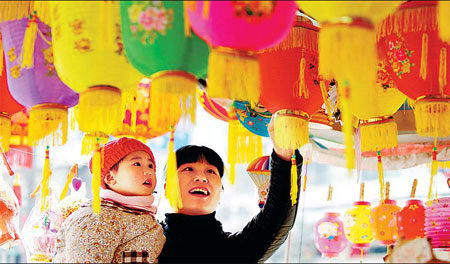IN BRIEF (Page 2)
Updated: 2013-02-22 09:42
(China Daily)
|
|||||||||||
|
A mother and daughter buy lanterns at a market in Huaibei, Anhui province, on Feb 19, in preparation for the Lantern Festival on Feb 24. It is celebrated on the 15th day of the first month in the Chinese lunar calendar, which ends the Chinese New Year celebrations. Wan Shanchao / for China Daily |
Environment
Smog readings 'no cause for alarm'
Research showing high levels of nitrogen-containing compounds in the capital's smog should not set off alarm bells, Beijing's Environmental Protection Bureau said. Zhai Xiaohui, a bureau official, said on Feb 18 that the concentration of organic compounds found in the smog is within the normal range. The government will continue to release readings showing the amount of PM2.5 and other pollutants, Zhai said.
The remarks were in response to research from the Chinese Academy of Sciences that found a large amount of nitrogen-containing organic compounds in the recent smog that shrouded the capital and neighboring cities.
The compounds are key components of the photochemical smog that shrouded Los Angeles in the 1940s and 1950s, causing hundreds of premature deaths and about 2,000 road accidents in a single day in 1954.
Employment
Returnees bet on multinationals
Among overseas returnees, those employed by multinational or foreign companies and those who start their own businesses enjoy better career development in China, analysts say.
Thanks to the country's rapid development, demand for such returnees from multinational and foreign companies has grown in recent years. Many who have returned are now senior executives in these companies, says a report conducted by the Center for China Globalization in Beijing last year.
More than 25 percent of overseas returnees have set up their own businesses in China, and another 42 percent said they plan to establish businesses, the report says. For the study, 499 people of different ages were surveyed, and most had studied or worked in the United States or Europe.
Tourism
Paid leave seen as tourism boost
Better enforcement is the key to ensure almost all workers in China enjoy paid leave by 2020, a target set by the top tourism authority, experts say.
The Outline for National Tourism and Leisure, issued by the China National Tourism Administration on Feb 18, includes measures such as reducing the price of entry to scenic spots and improving tourism and leisure infrastructure and accessibility.
The outline aims to meet increasing demands for tourism and leisure. Many economists regard paid annual leave, rather than three week-long national holidays, as the right way to boost the domestic tourism and leisure industries.
However, in a survey by China Youth Daily last year, of 2,400 people, 55 percent said they had never been the beneficiaries of paid leave, and only 22 percent said they could take fully paid leave every year.
Shipyard prepares to build Titanic II
A Chinese shipyard has formed a panel and upgraded its facilities to prepare for the construction of a replica of the Titanic for an Australian billionaire.
The state-owned CSC Jinling Shipyard Co in Nanjing, Jiangsu province, says it will take three years to build. The shipyard signed an agreement to build the liner in April with the Australian mining billionaire Clive Palmer.
The 270-meter-long, 53-meter-high liner will have nine floors and 840 rooms. About 900 crew members and 2,400 passengers will get to travel on its maiden voyage, scheduled for 2016, from England to North America, in accordance with the planned route of the original Titanic, which sank with the loss of 1,502 lives after striking an iceberg in the North Atlantic in 1912.
Society
Trust thy loved ones, but not others
Trust among people in China has dipped to a record low, with fewer than half the respondents to a survey saying they feel "most people can be trusted" while only about 30 percent said they trusted strangers.
The annual Blue Book of Social Mentality analyzed respondents' trust toward various people and organizations and concludes that trust is low. The trust score was 59.7 out of 100; in 2010 the score was 62.9.
The study, conducted by the Institute of Sociology under the Chinese Academy of Social Sciences, was based on a survey that asked more than 1,900 randomly selected residents in seven cities including Beijing and Shanghai.
The poll found that family members are viewed as the most trustworthy, followed by close friends and acquaintances.
Policy
Curbs on asset inquiries draw fire
Authorities in several cities have created regulations that prohibit real-name inquiries of residents' real estate assets, a move critics say is aimed at hobbling efforts to fight corruption.
A regulation issued on Feb 16 by the real estate asset registration authority in Zhangzhou, Fujian province, prohibits real-name inquiries of real estate information and would allow access only to the owner of the assets or prosecutors, police, courts, disciplinary watchdogs or securities regulators. In Yancheng, Jiangsu province, a similar regulation came into force on Jan 1.
In recent months there have been several scandals involving the exposure on the Internet of officials owning many homes.
China Daily
(China Daily 02/22/2013 page2)
Today's Top News
List of approved GM food clarified
ID checks for express deliveries in Guangdong
Govt to expand elderly care
University asks freshmen to sign suicide disclaimer
Tibet gears up for new climbing season
Media asked to promote Sino-Indian ties
Shots fired at Washington Navy Yard
Minimum growth rate set at 7%
Hot Topics
Lunar probe , China growth forecasts, Emission rules get tougher, China seen through 'colored lens', International board,
Editor's Picks

|

|

|

|

|

|






